Business Law Assignment Reports
VerifiedAdded on 2022/09/09
|7
|1346
|16
AI Summary
Contribute Materials
Your contribution can guide someone’s learning journey. Share your
documents today.
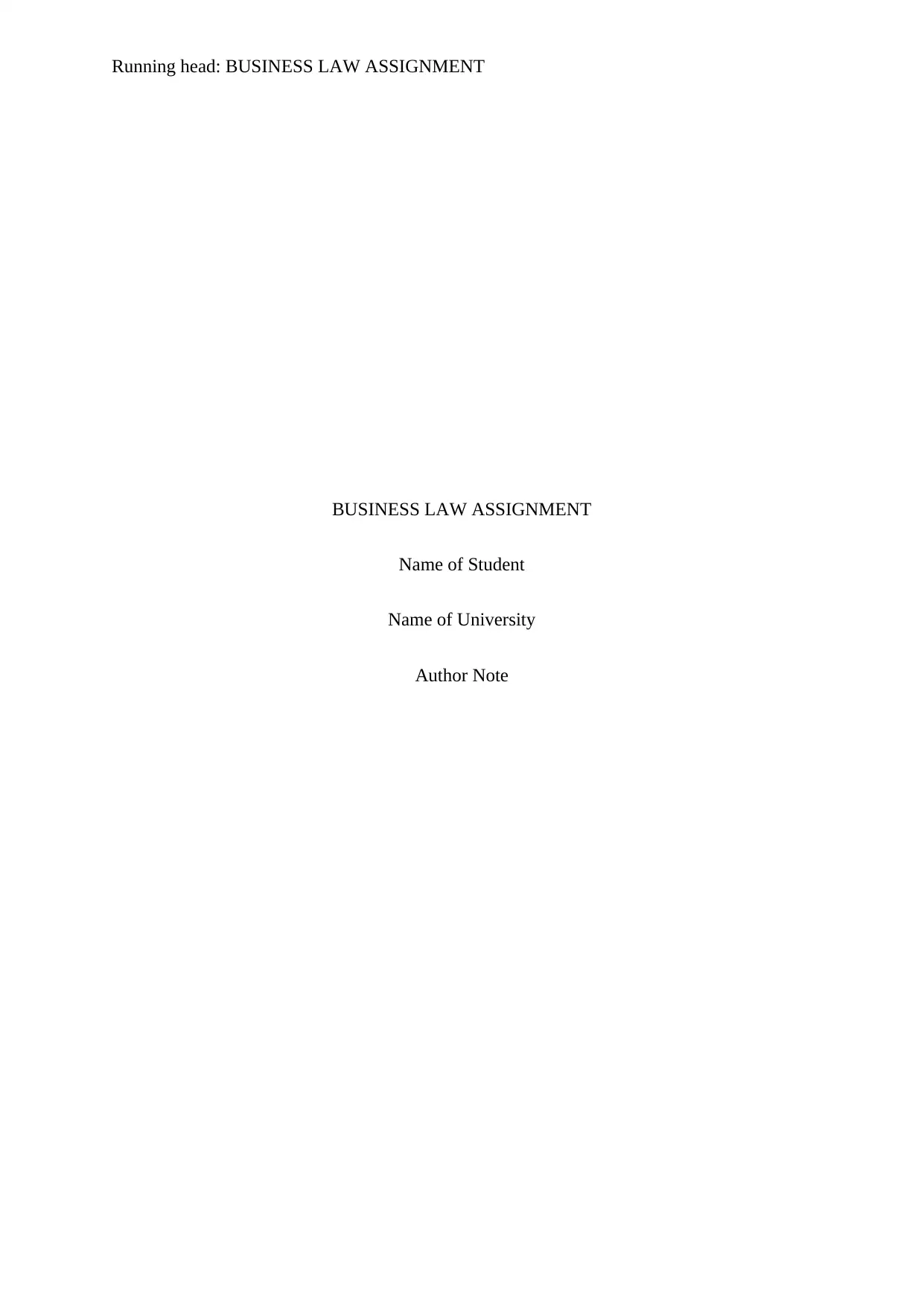
Running head: BUSINESS LAW ASSIGNMENT
BUSINESS LAW ASSIGNMENT
Name of Student
Name of University
Author Note
BUSINESS LAW ASSIGNMENT
Name of Student
Name of University
Author Note
Secure Best Marks with AI Grader
Need help grading? Try our AI Grader for instant feedback on your assignments.
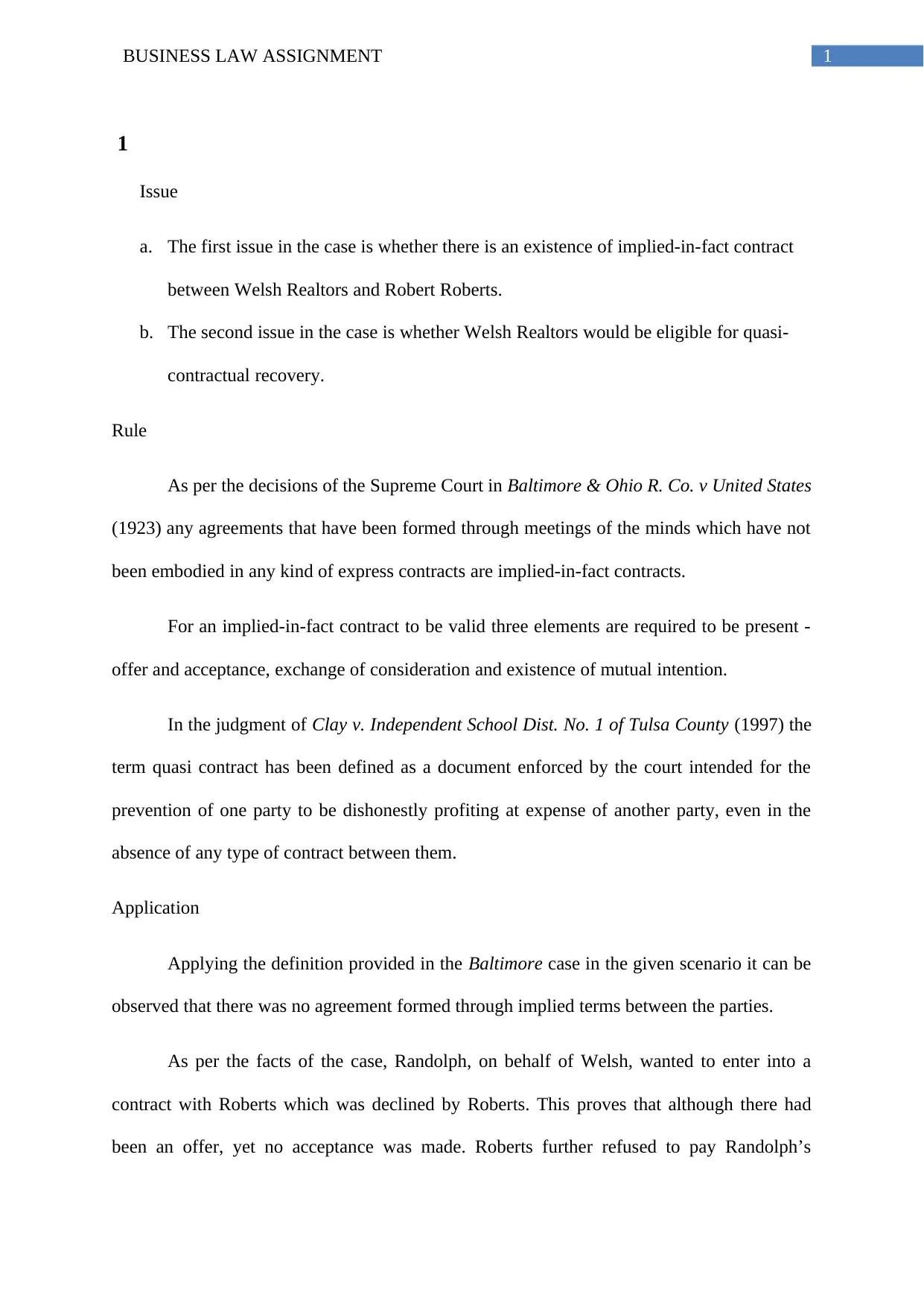
1BUSINESS LAW ASSIGNMENT
1
Issue
a. The first issue in the case is whether there is an existence of implied-in-fact contract
between Welsh Realtors and Robert Roberts.
b. The second issue in the case is whether Welsh Realtors would be eligible for quasi-
contractual recovery.
Rule
As per the decisions of the Supreme Court in Baltimore & Ohio R. Co. v United States
(1923) any agreements that have been formed through meetings of the minds which have not
been embodied in any kind of express contracts are implied-in-fact contracts.
For an implied-in-fact contract to be valid three elements are required to be present -
offer and acceptance, exchange of consideration and existence of mutual intention.
In the judgment of Clay v. Independent School Dist. No. 1 of Tulsa County (1997) the
term quasi contract has been defined as a document enforced by the court intended for the
prevention of one party to be dishonestly profiting at expense of another party, even in the
absence of any type of contract between them.
Application
Applying the definition provided in the Baltimore case in the given scenario it can be
observed that there was no agreement formed through implied terms between the parties.
As per the facts of the case, Randolph, on behalf of Welsh, wanted to enter into a
contract with Roberts which was declined by Roberts. This proves that although there had
been an offer, yet no acceptance was made. Roberts further refused to pay Randolph’s
1
Issue
a. The first issue in the case is whether there is an existence of implied-in-fact contract
between Welsh Realtors and Robert Roberts.
b. The second issue in the case is whether Welsh Realtors would be eligible for quasi-
contractual recovery.
Rule
As per the decisions of the Supreme Court in Baltimore & Ohio R. Co. v United States
(1923) any agreements that have been formed through meetings of the minds which have not
been embodied in any kind of express contracts are implied-in-fact contracts.
For an implied-in-fact contract to be valid three elements are required to be present -
offer and acceptance, exchange of consideration and existence of mutual intention.
In the judgment of Clay v. Independent School Dist. No. 1 of Tulsa County (1997) the
term quasi contract has been defined as a document enforced by the court intended for the
prevention of one party to be dishonestly profiting at expense of another party, even in the
absence of any type of contract between them.
Application
Applying the definition provided in the Baltimore case in the given scenario it can be
observed that there was no agreement formed through implied terms between the parties.
As per the facts of the case, Randolph, on behalf of Welsh, wanted to enter into a
contract with Roberts which was declined by Roberts. This proves that although there had
been an offer, yet no acceptance was made. Roberts further refused to pay Randolph’s
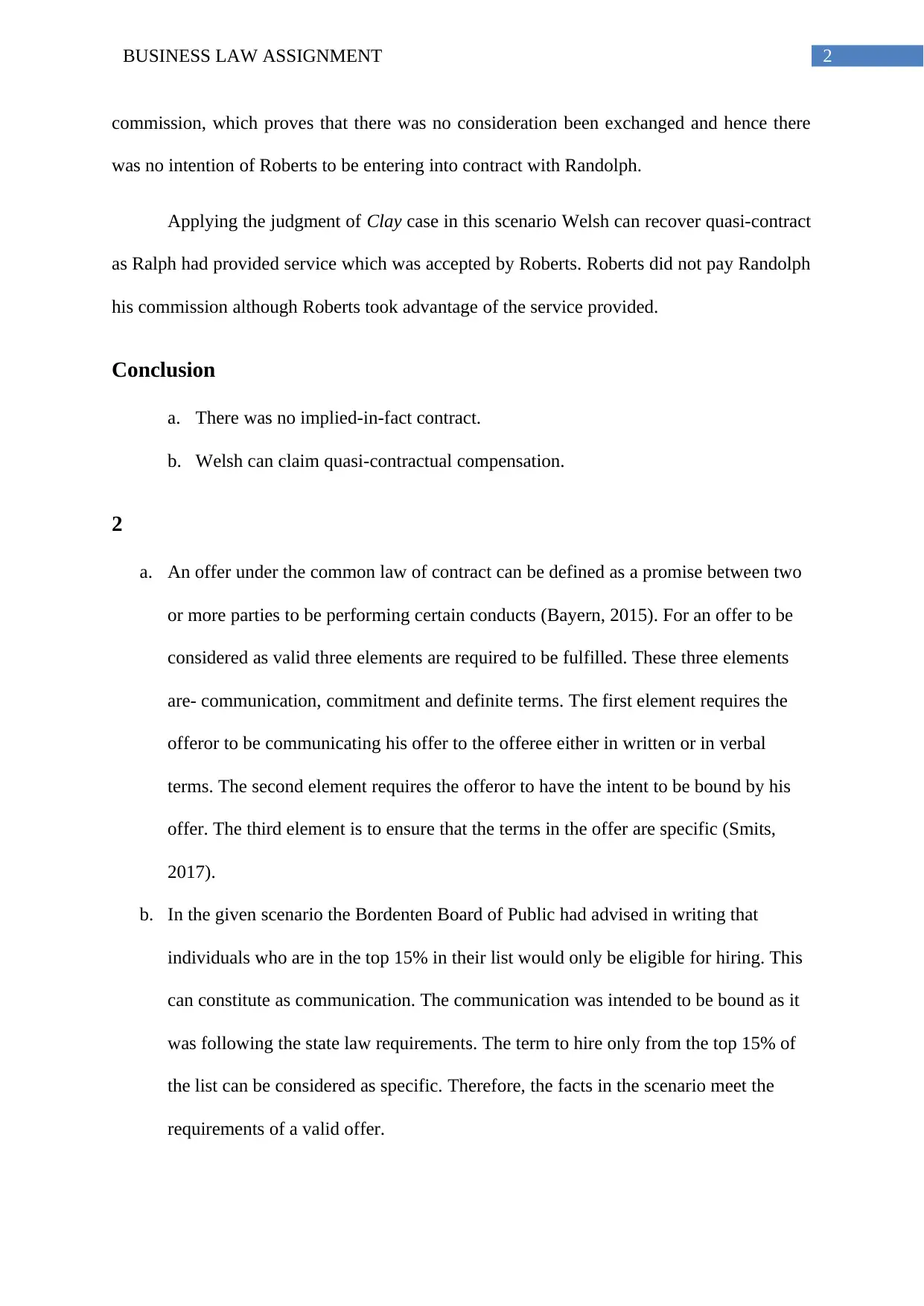
2BUSINESS LAW ASSIGNMENT
commission, which proves that there was no consideration been exchanged and hence there
was no intention of Roberts to be entering into contract with Randolph.
Applying the judgment of Clay case in this scenario Welsh can recover quasi-contract
as Ralph had provided service which was accepted by Roberts. Roberts did not pay Randolph
his commission although Roberts took advantage of the service provided.
Conclusion
a. There was no implied-in-fact contract.
b. Welsh can claim quasi-contractual compensation.
2
a. An offer under the common law of contract can be defined as a promise between two
or more parties to be performing certain conducts (Bayern, 2015). For an offer to be
considered as valid three elements are required to be fulfilled. These three elements
are- communication, commitment and definite terms. The first element requires the
offeror to be communicating his offer to the offeree either in written or in verbal
terms. The second element requires the offeror to have the intent to be bound by his
offer. The third element is to ensure that the terms in the offer are specific (Smits,
2017).
b. In the given scenario the Bordenten Board of Public had advised in writing that
individuals who are in the top 15% in their list would only be eligible for hiring. This
can constitute as communication. The communication was intended to be bound as it
was following the state law requirements. The term to hire only from the top 15% of
the list can be considered as specific. Therefore, the facts in the scenario meet the
requirements of a valid offer.
commission, which proves that there was no consideration been exchanged and hence there
was no intention of Roberts to be entering into contract with Randolph.
Applying the judgment of Clay case in this scenario Welsh can recover quasi-contract
as Ralph had provided service which was accepted by Roberts. Roberts did not pay Randolph
his commission although Roberts took advantage of the service provided.
Conclusion
a. There was no implied-in-fact contract.
b. Welsh can claim quasi-contractual compensation.
2
a. An offer under the common law of contract can be defined as a promise between two
or more parties to be performing certain conducts (Bayern, 2015). For an offer to be
considered as valid three elements are required to be fulfilled. These three elements
are- communication, commitment and definite terms. The first element requires the
offeror to be communicating his offer to the offeree either in written or in verbal
terms. The second element requires the offeror to have the intent to be bound by his
offer. The third element is to ensure that the terms in the offer are specific (Smits,
2017).
b. In the given scenario the Bordenten Board of Public had advised in writing that
individuals who are in the top 15% in their list would only be eligible for hiring. This
can constitute as communication. The communication was intended to be bound as it
was following the state law requirements. The term to hire only from the top 15% of
the list can be considered as specific. Therefore, the facts in the scenario meet the
requirements of a valid offer.
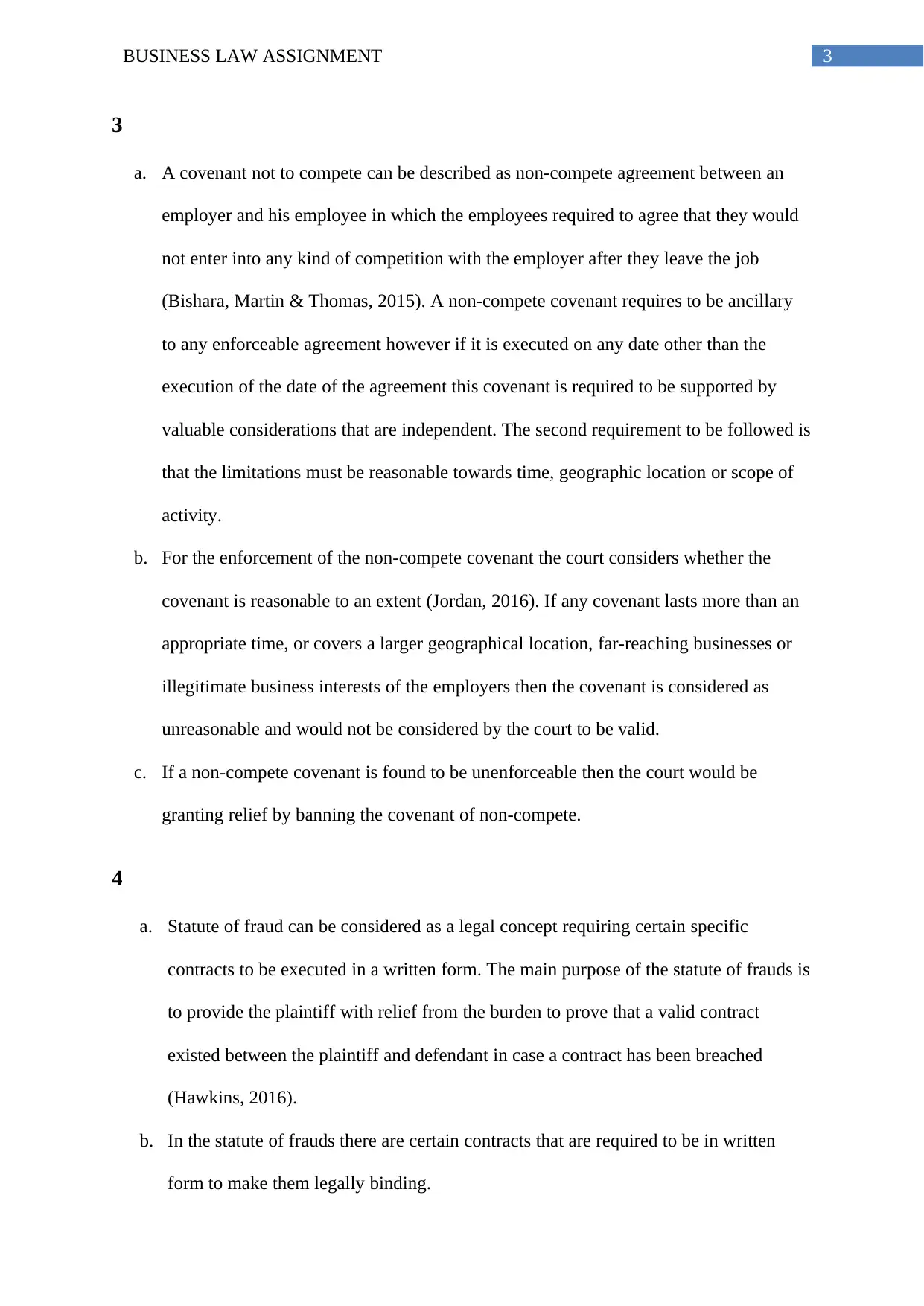
3BUSINESS LAW ASSIGNMENT
3
a. A covenant not to compete can be described as non-compete agreement between an
employer and his employee in which the employees required to agree that they would
not enter into any kind of competition with the employer after they leave the job
(Bishara, Martin & Thomas, 2015). A non-compete covenant requires to be ancillary
to any enforceable agreement however if it is executed on any date other than the
execution of the date of the agreement this covenant is required to be supported by
valuable considerations that are independent. The second requirement to be followed is
that the limitations must be reasonable towards time, geographic location or scope of
activity.
b. For the enforcement of the non-compete covenant the court considers whether the
covenant is reasonable to an extent (Jordan, 2016). If any covenant lasts more than an
appropriate time, or covers a larger geographical location, far-reaching businesses or
illegitimate business interests of the employers then the covenant is considered as
unreasonable and would not be considered by the court to be valid.
c. If a non-compete covenant is found to be unenforceable then the court would be
granting relief by banning the covenant of non-compete.
4
a. Statute of fraud can be considered as a legal concept requiring certain specific
contracts to be executed in a written form. The main purpose of the statute of frauds is
to provide the plaintiff with relief from the burden to prove that a valid contract
existed between the plaintiff and defendant in case a contract has been breached
(Hawkins, 2016).
b. In the statute of frauds there are certain contracts that are required to be in written
form to make them legally binding.
3
a. A covenant not to compete can be described as non-compete agreement between an
employer and his employee in which the employees required to agree that they would
not enter into any kind of competition with the employer after they leave the job
(Bishara, Martin & Thomas, 2015). A non-compete covenant requires to be ancillary
to any enforceable agreement however if it is executed on any date other than the
execution of the date of the agreement this covenant is required to be supported by
valuable considerations that are independent. The second requirement to be followed is
that the limitations must be reasonable towards time, geographic location or scope of
activity.
b. For the enforcement of the non-compete covenant the court considers whether the
covenant is reasonable to an extent (Jordan, 2016). If any covenant lasts more than an
appropriate time, or covers a larger geographical location, far-reaching businesses or
illegitimate business interests of the employers then the covenant is considered as
unreasonable and would not be considered by the court to be valid.
c. If a non-compete covenant is found to be unenforceable then the court would be
granting relief by banning the covenant of non-compete.
4
a. Statute of fraud can be considered as a legal concept requiring certain specific
contracts to be executed in a written form. The main purpose of the statute of frauds is
to provide the plaintiff with relief from the burden to prove that a valid contract
existed between the plaintiff and defendant in case a contract has been breached
(Hawkins, 2016).
b. In the statute of frauds there are certain contracts that are required to be in written
form to make them legally binding.
Secure Best Marks with AI Grader
Need help grading? Try our AI Grader for instant feedback on your assignments.
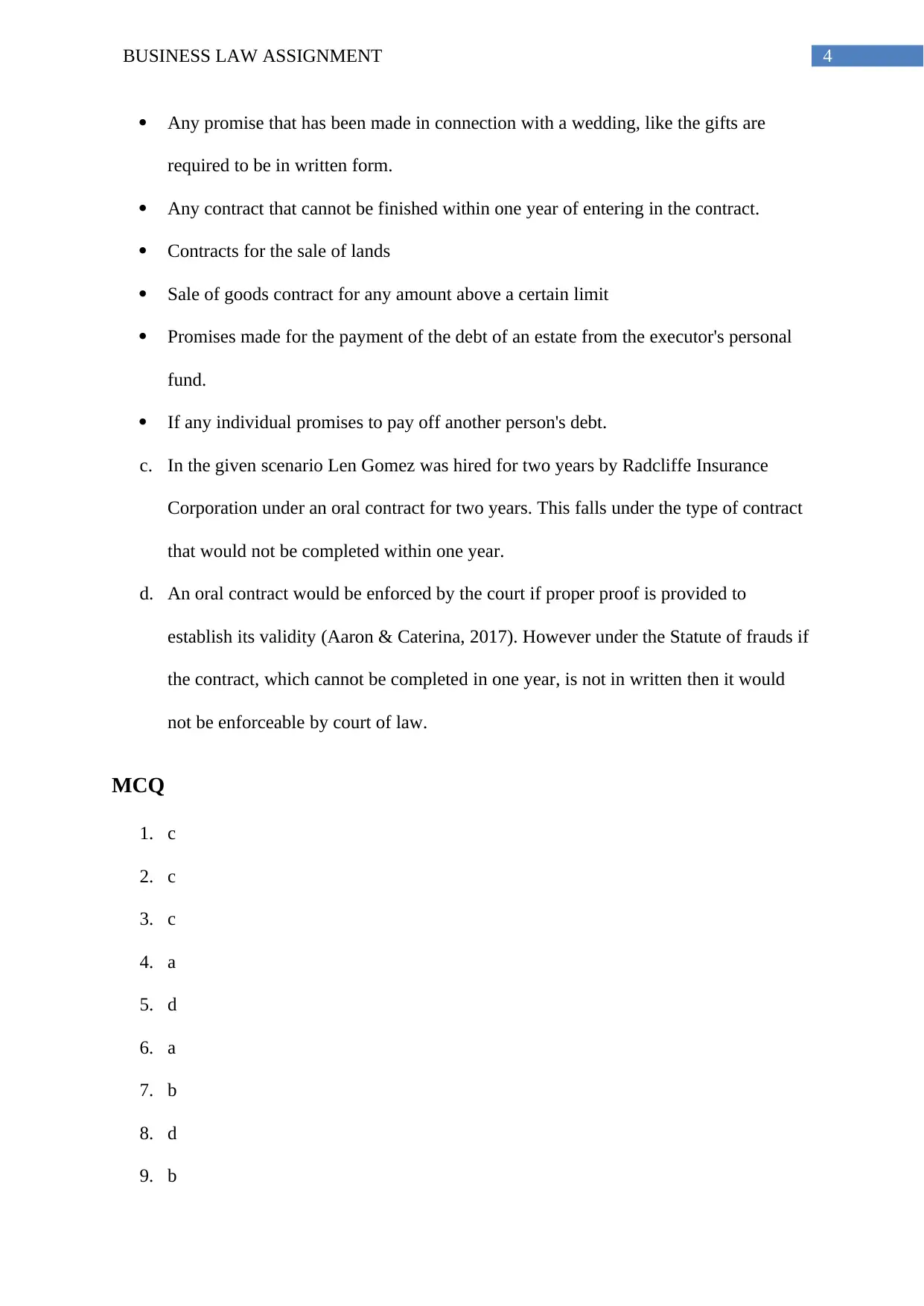
4BUSINESS LAW ASSIGNMENT
Any promise that has been made in connection with a wedding, like the gifts are
required to be in written form.
Any contract that cannot be finished within one year of entering in the contract.
Contracts for the sale of lands
Sale of goods contract for any amount above a certain limit
Promises made for the payment of the debt of an estate from the executor's personal
fund.
If any individual promises to pay off another person's debt.
c. In the given scenario Len Gomez was hired for two years by Radcliffe Insurance
Corporation under an oral contract for two years. This falls under the type of contract
that would not be completed within one year.
d. An oral contract would be enforced by the court if proper proof is provided to
establish its validity (Aaron & Caterina, 2017). However under the Statute of frauds if
the contract, which cannot be completed in one year, is not in written then it would
not be enforceable by court of law.
MCQ
1. c
2. c
3. c
4. a
5. d
6. a
7. b
8. d
9. b
Any promise that has been made in connection with a wedding, like the gifts are
required to be in written form.
Any contract that cannot be finished within one year of entering in the contract.
Contracts for the sale of lands
Sale of goods contract for any amount above a certain limit
Promises made for the payment of the debt of an estate from the executor's personal
fund.
If any individual promises to pay off another person's debt.
c. In the given scenario Len Gomez was hired for two years by Radcliffe Insurance
Corporation under an oral contract for two years. This falls under the type of contract
that would not be completed within one year.
d. An oral contract would be enforced by the court if proper proof is provided to
establish its validity (Aaron & Caterina, 2017). However under the Statute of frauds if
the contract, which cannot be completed in one year, is not in written then it would
not be enforceable by court of law.
MCQ
1. c
2. c
3. c
4. a
5. d
6. a
7. b
8. d
9. b

5BUSINESS LAW ASSIGNMENT
10. c
11. a
12. a
13. c
14. d
15. d
16. c
17. c
18. a
19. c
20. b
10. c
11. a
12. a
13. c
14. d
15. d
16. c
17. c
18. a
19. c
20. b
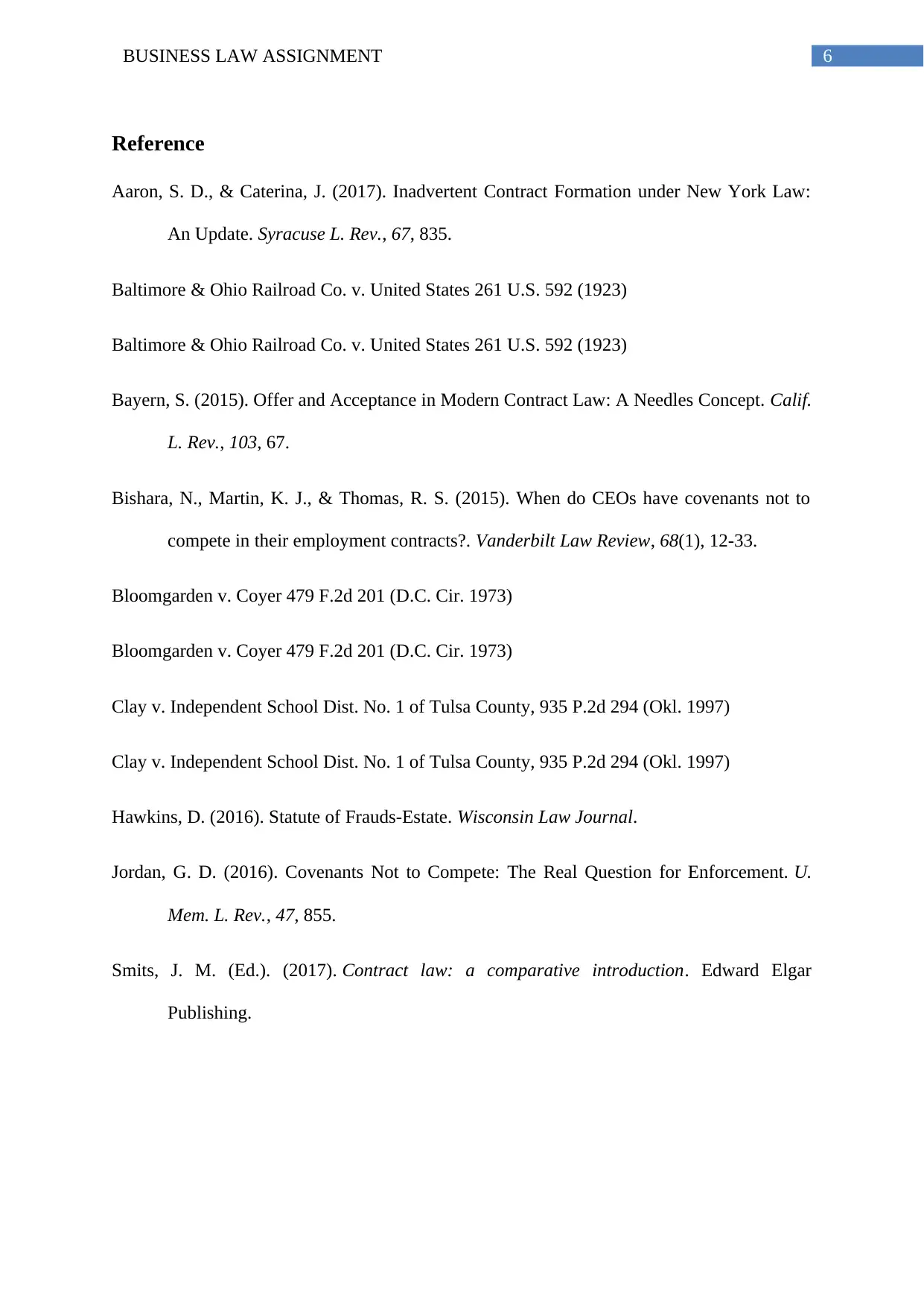
6BUSINESS LAW ASSIGNMENT
Reference
Aaron, S. D., & Caterina, J. (2017). Inadvertent Contract Formation under New York Law:
An Update. Syracuse L. Rev., 67, 835.
Baltimore & Ohio Railroad Co. v. United States 261 U.S. 592 (1923)
Baltimore & Ohio Railroad Co. v. United States 261 U.S. 592 (1923)
Bayern, S. (2015). Offer and Acceptance in Modern Contract Law: A Needles Concept. Calif.
L. Rev., 103, 67.
Bishara, N., Martin, K. J., & Thomas, R. S. (2015). When do CEOs have covenants not to
compete in their employment contracts?. Vanderbilt Law Review, 68(1), 12-33.
Bloomgarden v. Coyer 479 F.2d 201 (D.C. Cir. 1973)
Bloomgarden v. Coyer 479 F.2d 201 (D.C. Cir. 1973)
Clay v. Independent School Dist. No. 1 of Tulsa County, 935 P.2d 294 (Okl. 1997)
Clay v. Independent School Dist. No. 1 of Tulsa County, 935 P.2d 294 (Okl. 1997)
Hawkins, D. (2016). Statute of Frauds-Estate. Wisconsin Law Journal.
Jordan, G. D. (2016). Covenants Not to Compete: The Real Question for Enforcement. U.
Mem. L. Rev., 47, 855.
Smits, J. M. (Ed.). (2017). Contract law: a comparative introduction. Edward Elgar
Publishing.
Reference
Aaron, S. D., & Caterina, J. (2017). Inadvertent Contract Formation under New York Law:
An Update. Syracuse L. Rev., 67, 835.
Baltimore & Ohio Railroad Co. v. United States 261 U.S. 592 (1923)
Baltimore & Ohio Railroad Co. v. United States 261 U.S. 592 (1923)
Bayern, S. (2015). Offer and Acceptance in Modern Contract Law: A Needles Concept. Calif.
L. Rev., 103, 67.
Bishara, N., Martin, K. J., & Thomas, R. S. (2015). When do CEOs have covenants not to
compete in their employment contracts?. Vanderbilt Law Review, 68(1), 12-33.
Bloomgarden v. Coyer 479 F.2d 201 (D.C. Cir. 1973)
Bloomgarden v. Coyer 479 F.2d 201 (D.C. Cir. 1973)
Clay v. Independent School Dist. No. 1 of Tulsa County, 935 P.2d 294 (Okl. 1997)
Clay v. Independent School Dist. No. 1 of Tulsa County, 935 P.2d 294 (Okl. 1997)
Hawkins, D. (2016). Statute of Frauds-Estate. Wisconsin Law Journal.
Jordan, G. D. (2016). Covenants Not to Compete: The Real Question for Enforcement. U.
Mem. L. Rev., 47, 855.
Smits, J. M. (Ed.). (2017). Contract law: a comparative introduction. Edward Elgar
Publishing.
1 out of 7
Related Documents
Your All-in-One AI-Powered Toolkit for Academic Success.
+13062052269
info@desklib.com
Available 24*7 on WhatsApp / Email
![[object Object]](/_next/static/media/star-bottom.7253800d.svg)
Unlock your academic potential
© 2024 | Zucol Services PVT LTD | All rights reserved.





